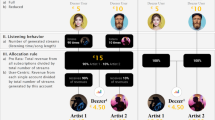Abstract
Filesharing has recently proved to be one of the most controversial applications in the Internet. Millions of users enjoy downloads of billions of media files such as songs or movies. But where do these files come from? While the economic rationale to download files is obvious, the rationale of individuals to actually share and therefore internalize the costs (i.e. the risk of being sued for copyright infringement) is not obvious. Consequently empirical studies have shown a large proportion of users not offering any but demanding files and therefore freeride on their peers.
Nevertheless sharing can be rational. This article offers a theoretical base to explain sharing and proves that the users’ utility considerations depend heavily on the networks life cycle. The user’s utility of sharing decreases over time. In order to prevent the (theoretically) inevitable break-down of the filesharing network, the authors present strategies for filesharing networks to enhance the user’s willingness to share.
Similar content being viewed by others
Literaturverzeichnis
Adar, Eytan; Huberman, Bernardo A.: Free Riding on Gnutella. In: First Monday 5 (2000) 10.
Andreoni, James: Why free ride? Strategies and Learning in Public Goods Experiments. In: Journal of Public Economics 37 (1988) 3, S. 291–304.
Andreoni, James: Impure Altruism and Donations to Public Goods: A Theory of Warm-Glow Giving. In: Economic Journal 100 (1990) S. 464–477.
Axelrod, Robert: Evolution of co-operation. Basic Books, New York 1984.
Bierman, H. Scott; Fernandez, Luis: Game theory with economic applications. Addison-Wesley, Reading 1998.
Bolton, Gary E.; Katok, Elena; Ockenfels, Axel: What’s in a Reputation? Indirect Reciprocity in an Image Scoring Game. Working Paper, Department of Economics and Management, University of Magdeburg, Magdeburg 2001.
Bonacich, Phillip: Four Kinds of Social Dilemmas within Exchange Networks. http://www.uiowa.edu/~grpproc/crisp/crisp.1.1.html, Abruf am 2002-10-6.
Buskens, Vincent; Weesie, Jeroen: Cooperation via Social Networks. In: Analyse & Kritik 22 (2000) 1, S. 44–74.
Carman, James M.: Theories of Altruism and Behavior Modification Campaigns. In: Journal of Macromarketing 12 (1992) Spring, S. 5–18.
Cave, Damien: The Mojo solution. Salon.com Technology http://archive.salon.com/tech/view/2000/10/09/mojo_nation/print.html, Abruf am 2003-3-6.
Clement, Michel; Nerjes, Guido; Runte, Matthias: Bedeutung von Peer-to-Peer Technologien für die Distribution von Medienprodukten im Internet. In: Schoder, Detlef; Fischbach, Kai; Teichmann, René (Hrsg.): Peer-to-Peer (P2P): Ökonomische, technologische und juristische Perspektiven. Springer, Berlin 2002, S. 71–80.
Currie, John M.; Murphy, John A.; Schmitz, Andrew: The Concept of Economic Surplus and its Use in Economic Analysis. In: Economic Journal 81 (1971), S. 215–248.
Dawes, Robyn M.: Social Dilemmas. In: Annual Review of Psychology 31 (1980), S. 169–193.
Detering, Dietmar: Ökonomie der Medieninhalte. Allokative Effizienz und Soziale Chancengleichheit in den Neuen Medien. Lit-Verlag, Münster 2001.
Dixit, Avinash K.; Nalebuff, Barry J.: Spieltheorie fü r Einsteiger. Schaeffer-Poeschel, Stuttgart 1995.
Esser, Hartmut: Soziales Handeln. Campus, Frankfurt/Main 2000.
Franzen, Axel: Group size effects in social dilemmas: A review of the experimental literature and some new results for one-shot N-PD games. In: Schulz, Ulrich; Albers, Wulf; Müller, Ulrich (Hrsg.): Social Dilemmas and Cooperation. Springer, Berlin 1994, S. 117–146.
Golle, Philippe; Leyton-Brown, Kevin; Mironov, Ilya; Lillibridge, Mark: Incentives for Sharing in Peer-to-Peer Networks. In: Fiege, Ludger; Mühl, Gero; Wilhelm, Uwe G. (Hrsg.): WELCOM 2001, LNCS 2232. Springer, Berlin 2001, S. 75–
Hagel, John; Armstrong, Arthur G.: Net Gain — Profit im Netz: Märkte erobern mit virtuellen communities. Gabler, Wiesbaden 1997.
Hardin, Garrett: The Tragedy of the Commons. In: Science 162 (1968) S. 1243–1248.
Hoffmann, Robert: Social Cognition in the Evolutionary Chicken Game, 7th International Conference of the Society for Computational Economics, Yale University, New Haven 2001.
Holler, Manfred J.; Illing, Gerhard: Einfü hrung in die Spieltheorie. Springer, Berlin 1996.
Kiyonari, Toko; Tanida, Shigehito; Yamagishi, Toshio: Social exchange and reciprocity: Confusion or a heuristic? In: Evolution and Human Behavior 21 (2000) 6, S. 411–427.
Kollock, Peter: The Economies of Online Cooperation: Gifts and Public Goods in Cyberspace. In: Smith, Marc; Kollock, Peter (Hrsg.): Communities in Cyberspace. Routledge, London 2000, S. 220–239.
Kollock, Peter; Smith, Marc: Managing the Virtual Commons: Cooperation and Conflict in Computer Communities. In: Herring, Susan (Hrsg.): Computer-Mediated Communication: Linguistic, Social, and Cross-Cultural Perspectives. Benjamins, Amsterdam 1996, S. 109–128.
Micko, Hans-Christoph: Experimental Matrix Games. http://www.uni-bonn.de/mathpsyc/doc/micko/4c.htm, Abruf am 2002-10-6.
Nowak, Martin A.; Sigmund, Karl: Evolution of Indirect Reciprocity by Image Scoring. In: Nature 393 (1998) S. 573–577.
O’Brian, Jeffrey M.: Would you download Music from this Man? http://www.wired.com/wired/archive/10.05/superuser.html Abruf am 2002-10-6.
Offer, Avner: Between the gift and the market: the economy of regard. In: Economic History Review 50 (1997) 3, S. 450–476.
Olson, Mancur: Die Logik des kollektiven Handelns: Kollektivgüter und die Theorie der Gruppen. Mohr Siebeck, Tübingen 1998.
Ostrom, Elinor; Gardner, Roy; Walker, James: Rules, games, and common-pool resources. The University of Michigan Press, Ann Arbor 1994.
Saroiu, Stefan; Gummadi, P. Krishna; Gribble, Steven D.: A Measurement Study of Peer-to-Peer File Sharing Systems, Proceedings of Multimedia Computing and Networking, MMCN’02, San Jose 2002.
Shirky, Clay: Listening to Napster. In: Oram, Andy (Hrsg.): Peer-to-Peer: Harnessing the Benefits of a Disruptive Technology. O’Reilly, Sebastopol 2001, S. 21–37.
Tacke, Georg: Nichtlineare Preisbildung: Höhere Gewinne durch Differenzierung. Gabler, Wiesbaden 1989.
Thaler, Richard: Mental Accounting and Consumer Choice. In: Marketing Science 4 (1985) 3, S. 199–214.
Walsh, Gianfranco; Frenzel, Tobias; Wiedmann, Klaus-Peter: SE-Commerce-relevante Verhaltensmuster als Herausforderung für das Marketing. In: Marketing ZFP 24 (2002) 3, S. 207–223.
Weiber, Rolf: Diffusion von Telekommunikation: Problem der kritischen Masse. Gabler, Wiesbaden 1992.
Wilson, Robert B.: Nonlinear Pricing. Oxford University Press, New York 1993.
Yamagishi, Toshio; Cook, Karen S.: Generalized Exchange and Social Dilemmas. In: Social Psychology Quarterly 56 (1993) 4, S. 235–248.
Author information
Authors and Affiliations
Rights and permissions
About this article
Cite this article
Becker, J.U., Clement, M. Das ökonomische kalkül eines anbieters von mediendateien bei filesharing-diensten. Wirtschaftsinf 45, 261–271 (2003). https://doi.org/10.1007/BF03254944
Issue Date:
DOI: https://doi.org/10.1007/BF03254944




